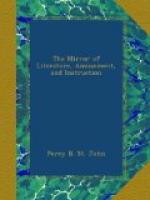* * * * *
SPIRIT OF THE PUBLIC JOURNALS.
* * * * *
POTIER, THE FRENCH “LISTON.”
Potier, generally speaking—and it is the same with our own Liston—has never Actually observed any thing of what he presents to us. It is the spontaneous effusion of his own feelings—the immediate creation of his own mind—frequently arising at the moment at which we see it, and therefore never to be seen a second time—but always generated by the actor himself, and never mixed up with any thing else of an extraneous nature. This is one cause of the extraordinary variety of this actor, and consequently of his extraordinary popularity in his own country. We never tire of going to see him, because he is never the same on any two nights—or rather he never performs the same character twice in the same manner. It is also the secret of his unrivalled originality. There are but very few characters in which he can repeat himself, even if he would. And those are such as depend for their comicality upon collateral circumstances connected with them, rather than upon any thing essential to themselves.
There are some persons whose every look, feature, expression, and tone of voice conduce to comic effects; and many an actor has owed his success more to these than to any mental qualities or dispositions corresponding with them; or has even been successful in spite of these latter being in no degree adapted to the profession which circumstances have induced him to adopt. In proof of this fact, comic actors are quite as often dull and solemn people, as droll ones, in private life. The most remarkable instance of a face being a fortune, in this respect, is our own Liston. If he had not possessed a comic countenance, nothing could have prevented him from being a tragic actor, or have made him a comic one; for it is well understood that all his inclinations led him in that direction. The truth is, that Liston’s style of acting is too chaste and natural to have been so universally popular as it is, but for the irresistible drollery of his features—which are the finest farce that ever was written. Now in this respect, as in all others, Potier differs from his contemporaries.
His voice, his face, and his person altogether, are in themselves antidotes to mirth, and might almost be supposed to set it at defiance. He might play the Apothecary, in Romeo and Juliet, or the Anatomie Vivante, without painting for them—as Stephen Kemble used to play their antithesis, Falstaff, without stuffing. And yet, instead of this seeming contradiction counteracting the essentially comic turn of his mind, the latter is so completely paramount, that it changes every thing within its reach to its own complexion.—New Monthly Magazine.
* * * * *
FRAGMENT OF THE NARRATIVE OF A STUDENT AT LAW.




